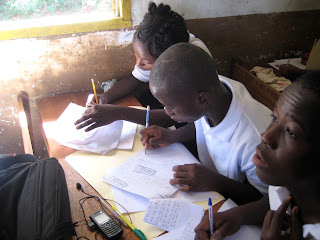Secondary school writing teachers, try reading Should I Share My Ice Cream? by Mo
Willems aloud to a class that is learning to argue, persuade or advise.
The problem this book presents is stated in the
title: Gerald has an ice cream cone and is of two minds whether to share it
with Piggie. The first half of the book uses all kinds of argument and gets
nowhere.
- · Piggie loves ice cream.
Piggie is my best friend. (concession, logos)
- · We should share with
friends. (commonly-held value, ethos)
- · This ice cream is SO
tempting! (emotion, pathos)
- · Maybe she won't like this
flavor. It is wrong to force something unappetizing on someone. (commonly-held
value, ethos)
- · I can just not tell her—she'll
never know! (a stance to win)
By page 25 we are looking for how this will end. Stop
reading the book aloud here. Have each student write an opinion for each side,
drawing on their own personal experiences.
After they have written, go on reading. We expect a
reasoned conclusion, don't we? Is that what Gerald will carry out? Or are
there other ways opposing opinions can be resolved?
Half-way through the book, Gerald moves into speculation--What
if Piggie is sad?--and from there into creating the future. And by staying in
the future tense, Gerald becomes able to visualize future choices and their
consequences. In other words, he moves into deliberative argument.
In the end, we feel satisfied when he comes to his
decision. Deliberative argument is an empowering strategy and it is important
for our student writers and debaters to acquire it.
Then comes a twist. The author carries deliberative
argument one step further when the future takes on two complications:
- · Oops, Gerald's decision was
taken too late. His ice cream melted, so a) nobody ate it at all, b) he could
not make Piggie happy, and c) he's a failure.
- · The roles become reversed. Piggie
gets a cone herself and does what it took Gerald so long to decide on doing: she
shares it.
Now Gerald ponders—should he stick with his plan and
mope, or adapt? But what a change in his mood! The frenzy of indecision in the first
half of the book is gone, because deliberative argument has freed him. He
contentedly goes for letting somebody else achieve his goal of sharing.
Thanks, Mo Willems, for such a great book!
Relevant Reads
Heinrichs, J. (2007). Thank you for arguing: what Aristotle, Lincoln and Homer Simpson can
teach us about the art of persuasion. New York: Three Rivers Press.
Miller, R. (2011)
"Being without existing: the futures community at a turning point? A
comment on Jay Ogilvy's 'Facing the fold,'" foresight, Vol. 13 Iss: 4, pp.24 – 34.
Willems, M. (2011). Should I share my ice cream? New York: Hyperion Books for Children.
© 2012 Jacqueline
Leigh




















